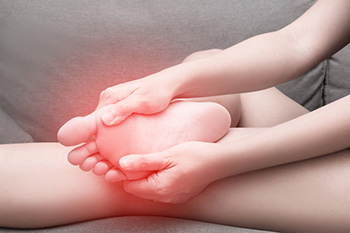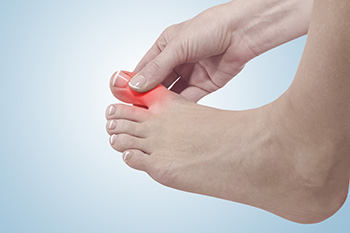

Heel spur removal surgery is a procedure to alleviate pain caused by heel spurs, which are bony growths on the underside of the heel bone. This condition often results in significant discomfort and can interfere with daily activities. The surgery is typically performed under local or general anesthesia. A podiatric surgeon makes an incision near the heel spur to access the affected area during the procedure. The spur is carefully removed, often along with any inflamed tissue or bursa contributing to pain. The surgeon may also address any underlying conditions contributing to the heel spur, such as plantar fasciitis. If you have a heel spur that is causing you pain and discomfort, it is suggested that you are under the care of a podiatrist who can determine if surgery is right for you.
Foot surgery is sometimes necessary to treat a foot ailment. To learn more, contact Dr. Alan J. Spector of Shore Podiatry. Our doctor will assist you with all of your foot and ankle needs.
When Is Surgery Necessary?
Foot and ankle surgery is generally reserved for cases in which less invasive, conservative procedures have failed to alleviate the problem. Some of the cases in which surgery may be necessary include:
What Types of Surgery Are There?
The type of surgery you receive will depend on the nature of the problem you have. Some of the possible surgeries include:
Benefits of Surgery
Although surgery is usually a last resort, it can provide more complete pain relief compared to non-surgical methods and may allow you to finally resume full activity.
Surgical techniques have also become increasingly sophisticated. Techniques like endoscopic surgery allow for smaller incisions and faster recovery times.
If you have any questions please feel free to contact our office located in Point Pleasant, NJ . We offer the newest diagnostic and treatment technologies for all your foot and ankle needs.

Foot problems can occur in various areas, each with distinct causes and implications. Ankle pain may arise from injuries, sprains, or conditions like arthritis, affecting mobility and stability. Pain on the inside of the foot is often linked to issues such as flat feet or posterior tibial tendon dysfunction. This is a condition where the tendon that supports the arch of the foot becomes damaged or weakened, leading to flatfoot and pain. Discomfort in the big toe, frequently associated with gout or bunions, can be debilitating and impact daily activities. Pain in the middle of the foot might indicate metatarsalgia or stress fractures, leading to discomfort during movement. Additionally, heel pain, commonly caused by plantar fasciitis or Achilles tendonitis, often worsens with the first steps in the morning. If you have any type of foot pain, it is suggested that you schedule an appointment with a podiatrist who can diagnose the cause and offer the appropriate treatment options.
Foot Pain
Foot pain can be extremely painful and debilitating. If you have a foot pain, consult with Dr. Alan J. Spector from Shore Podiatry. Our doctor will assess your condition and provide you with quality foot and ankle treatment.
Causes
Foot pain is a very broad condition that could be caused by one or more ailments. The most common include:
Diagnosis
To figure out the cause of foot pain, podiatrists utilize several different methods. This can range from simple visual inspections and sensation tests to X-rays and MRI scans. Prior medical history, family medical history, and any recent physical traumatic events will all be taken into consideration for a proper diagnosis.
Treatment
Treatment depends upon the cause of the foot pain. Whether it is resting, staying off the foot, or having surgery; podiatrists have a number of treatment options available for foot pain.
If you have any questions, please feel free to contact our office located in Point Pleasant, NJ . We offer the newest diagnostic and treatment technologies for all your foot care needs.

Volleyball players are prone to ankle injuries due to the dynamic nature of the game. To reduce the risk, proper warm-up routines are essential, focusing on flexibility and strength exercises specifically for the lower legs. Wearing supportive footwear designed for volleyball can also help to stabilize the ankle and absorb shock. Additionally, practicing correct techniques for jumping and landing minimizes strain on the ankles. It is also important to strengthen the muscles surrounding the ankle through targeted strength training exercises. Incorporating balance and agility drills into regular training can improve coordination and reduce the likelihood of injury. Ankle injuries are typically painful, and can force a volleyball player to refrain from playing. If you have sustained an ankle injury while playing volleyball, it is suggested that you promptly visit a podiatrist who can offer effective treatment solutions.
Sports related foot and ankle injuries require proper treatment before players can go back to their regular routines. For more information, contact Dr. Alan J. Spector of Shore Podiatry. Our doctor can provide the care you need to keep you pain-free and on your feet.
Sports Related Foot and Ankle Injuries
Foot and ankle injuries are a common occurrence when it comes to athletes of any sport. While many athletes dismiss the initial aches and pains, the truth is that ignoring potential foot and ankle injuries can lead to serious problems. As athletes continue to place pressure and strain the area further, a mild injury can turn into something as serious as a rupture and may lead to a permanent disability. There are many factors that contribute to sports related foot and ankle injuries, which include failure to warm up properly, not providing support or wearing bad footwear. Common injuries and conditions athletes face, including:
Sports related injuries are commonly treated using the RICE method. This includes rest, applying ice to the injured area, compression and elevating the ankle. More serious sprains and injuries may require surgery, which could include arthroscopic and reconstructive surgery. Rehabilitation and therapy may also be required in order to get any recovering athlete to become fully functional again. Any unusual aches and pains an athlete sustains must be evaluated by a licensed, reputable medical professional.
If you have any questions please feel free to contact our office located in Point Pleasant, NJ . We offer the newest diagnostic and treatment technologies for all your foot and ankle needs.

Gout is a form of arthritis characterized by sudden, severe pain, redness, and swelling in the joints, most commonly affecting the big toe, a condition known as podagra. It occurs when high levels of uric acid in the blood form sharp crystals that accumulate in joints. Symptoms often include intense joint pain that typically occurs at night, lingering discomfort, inflammation, and limited range of motion. Causes of gout include a diet high in purines, found in red meat and seafood, excessive alcohol consumption, obesity, and certain medical conditions like hypertension and kidney disease. Men, postmenopausal women, and people with a family history of gout are at higher risk. Gout attacks, or flare-ups, can recur if underlying causes are not addressed. Prevention strategies involve maintaining a healthy diet, staying hydrated, limiting alcohol intake, and managing body weight. If you suspect you have gout in your big toe, it is suggested that you schedule an appointment with a podiatrist for a diagnosis, treatment, and a long-term management plan to prevent joint damage and improve quality of life.
Gout is a painful condition that can be treated. If you are seeking treatment, contact Dr. Alan J. Spector from Shore Podiatry. Our doctor will treat your foot and ankle needs.
What Is Gout?
Gout is a form of arthritis that is characterized by sudden, severe attacks of pain, redness, and tenderness in the joints. The condition usually affects the joint at the base of the big toe. A gout attack can occur at any random time, such as the middle of the night while you are asleep.
Symptoms
Risk Factors
Prior to visiting your podiatrist to receive treatment for gout, there are a few things you should do beforehand. If you have gout you should write down your symptoms--including when they started and how often you experience them, important medical information you may have, and any questions you may have. Writing down these three things will help your podiatrist in assessing your specific situation so that he or she may provide the best route of treatment for you.
If you have any questions, please feel free to contact our office located in Point Pleasant, NJ . We offer the newest diagnostic and treatment technologies for all your foot care needs.